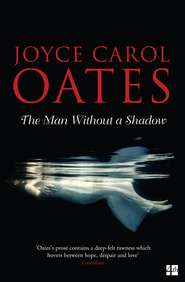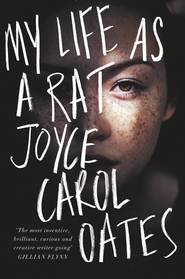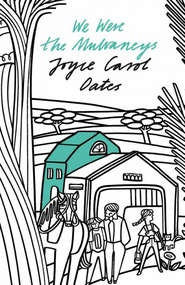По всем вопросам обращайтесь на: info@litportal.ru
(©) 2003-2025.
✖
The Sacrifice
Автор
Год написания книги
2019
Настройки чтения
Размер шрифта
Высота строк
Поля
“Nah I’m thinking we better be goin. Talkin with you aint worked out like I hoped, see, ma’am, you one of them.”
Mrs. Frye spoke contemptuously. Iglesias felt dismay.
I am one of you, not one of them. Believe me!
“Please, Mrs. Frye. Just a few minutes. No recording.”
All this while Sybilla had been sitting mute and shivering. Only vaguely had she seemed to be listening to the adult women, with an air of disdain.
Iglesias saw herself in the girl, she believed to be fourteen. She saw herself at that age, sulky, sullen, defiant and scared.
She’d been sexually molested, too. More than once. And many times sexually harassed and threatened. But never raped, never brutally beaten. Not Ines Iglesias.
The Fryes lived on Third Street, in that run-down neighborhood by the river. Abandoned factories, shuttered and part-burned houses, streets clogged with abandoned and rusting vehicles. Pascayne South High, lowest-ranked in the city. The Fifth Precinct, with the highest crime rate. You had to grow up swiftly there.
In the Iglesias neighborhood, adjacent to Forest Park, there were blocks of single-family homes, neatly tended lawns and attached garages. There were streets not clogged with parked, abandoned vehicles. There was Forest Park High from which an impressive number of students went on to college and where there were no fights, knifings, rapes on or near the premises.
But I am one of you! Please trust me.
Though she hadn’t grown up in the inner city, Iglesias had had good reason to fear and distrust the Pascayne police. Family members, relatives, friends, neighbors had had encounters with (white) police of which you had to say the good thing was, none of these encounters had been fatal.
Though she knew of encounters that had been fatal.
Though she knew police officers who were racists, even now—in 1987. After the Pascayne PD had been “integrated” for twenty years.
It was a mark of their contempt for her, she supposed—making racist remarks when she could overhear.
Yet, racist remarks that weren’t directed toward her or her kind—light-skinned Hispanic.
It was African-Americans they held in particular contempt—niggers.
Though maybe behind her back, in their careless, jocular way, that exaggerated the bigotry they naturally felt in the service of humor, they referred to her as nigger, too.
Iglesias not bad-lookin for a nigger, is she?
Man, not bad!
Got her an ass on her.
I seen better.
In a quiet urging voice Iglesias was telling Sybilla Frye how she wanted to help her. How she wanted to know who’d hurt her so badly, who the assailant or assailants were so that they could be arrested, gotten off the street.
With a little shiver of dread Sybilla drew the blanket closer around her. She seemed to be rousing herself out of a dream.
Shaking her head looking now scared and miserable. Iglesias was wondering how a rape victim returned to her life—to school, to her friends. Already news of the missing Frye girl found hog-tied in the canning factory was on the street.
Sybilla leaned to her mother and murmured in her ear. Her swollen lips moved but Iglesias couldn’t make out what she was whispering.
“Oh honey, I know,” Mrs. Frye said to the girl; then, to Iglesias, with grim satisfaction, “S’b’lla sayin they gon kill her, ma’am. Told her they gon kill her whole family, she tells you.”
It was strange how Mrs. Frye addressed her daughter gently and lovingly, or harshly and reproachfully. If you were the daughter you would have no way of guessing which Mama would emerge.
Though generally, it was safe to surmise that when Sybilla did not oppose her mother in any way, in even the expression on her face, the tilt of her head or the set of her back, the gentle-loving Mama emerged.
“But we can protect you, Sybilla. We can put you in protective custody until your assailants are arrested.”
Iglesias was a police officer, she said such improbable things.
How many times uttered by police officers in such situations in Pascayne, to whatever futile end.
“Off’cer, that is such bullshit. Half the people we know believe that shit you tell them, they shot down dead in the street. Whoever do it don bother waitin for dark, he just shoot. You aint bein honest with my daughter an me, an you know it. Why I asked for an African-American woman, and you aint her.”
“I am her. I’m here to help you.”
“You a woman, you got to know what they gon do to my daughter if she say who hurt her. All she told me, it was five of them—men. Men not boys. Nobody she knew, from the neighborhood or her school. That’s all she told me, she’s too scared.” Mrs. Frye smiled a sharp mirthless smile revealing a gap between her two front teeth like an exclamation mark.
Iglesias tried again with Sybilla. “So—you say—it was five men? No one you recognized? Could you begin at the beginning, please? Your mother says you went missing on Thursday …”
Slowly then, as if each word were a painful pebble in her mouth, Sybilla began to speak in a hoarse whisper. She was squirming inside the blanket, looking not at the police officer who’d fixed her face into an expression of extreme solicitude and interest but staring at the floor. There appeared to be a slight cast in her left eye. Perhaps this was why she didn’t look up. Iglesias could not determine if the girl was genuinely frightened or if there was something childishly resistant and even defiant about her—an attitude that had to do less with Iglesias than with the mother who remained at all times close beside her, half-sitting on the examination table, a physical presence that must have been virtually overwhelming to the girl yet from which she had no recourse.
Iglesias could see that, though Sybilla’s eyes were swollen and discolored, these were Ednetta Frye’s eyes: thick-lashed, so dark as to appear black, large and deep-set. During her hurried briefing Iglesias had been told that the victim was possibly mentally defective, maybe retarded, which was why it was so difficult to communicate with her, but Iglesias didn’t think this was true.
Iglesias asked Sybilla to repeat what she’d said, a little louder. She was leaning close, to listen.
In the hoarse slow whisper Sybilla recounted how she’d been coming home from school Thursday afternoon when somebody, some men, came up behind her with a canvas they lowered over her head and grabbed her and dragged her away in a van and kept her there for three days—she thought it was three days, she wasn’t sure because she was not conscious all the time—and punched and kicked her and did things to her and laughed at her when she was crying and later put mud and dog shit onto her and wrote on her “nasty words” and tied her up and left her in the factory cellar saying there were “other nigras” in that place who had died there.
Starting to cry now, and Mrs. Frye squeezed her hand, and for a moment it didn’t seem that Sybilla would continue.
Iglesias asked if she’d been able to see faces? Could she describe the men—their age, race? Were they known to her?
Sybilla shook her head, they weren’t known to her. She seemed about to say more, then stopped.
“You’re sure that these men are not known to you, Sybilla? Could you describe any of them?”
Sybilla stared at the floor. Tears welled in her eyes and spilled over her bruised cheeks.
“Did they hurt you sexually?”
Sybilla sat very still staring at the floor. Her face was shiny now with tears.
Mrs. Frye said, gently urging, “S’b’lla, honey, you got to tell this lady, see? You got to tell her what you can. You aint told me all of it, has you?—you know you aint. Now, you tell her.”
“Did they rape you, Sybilla?”
Sybilla shook her head just slightly, yes.
“More than one man, you’ve said?”











